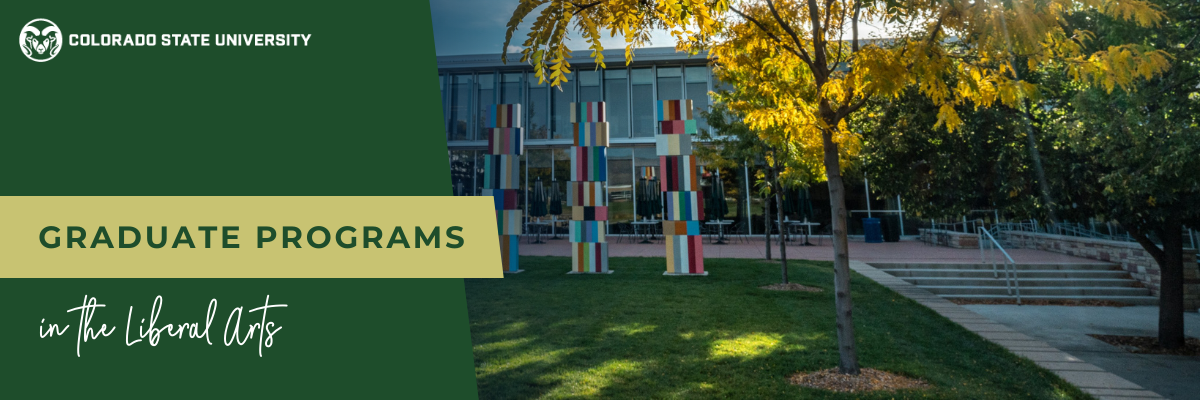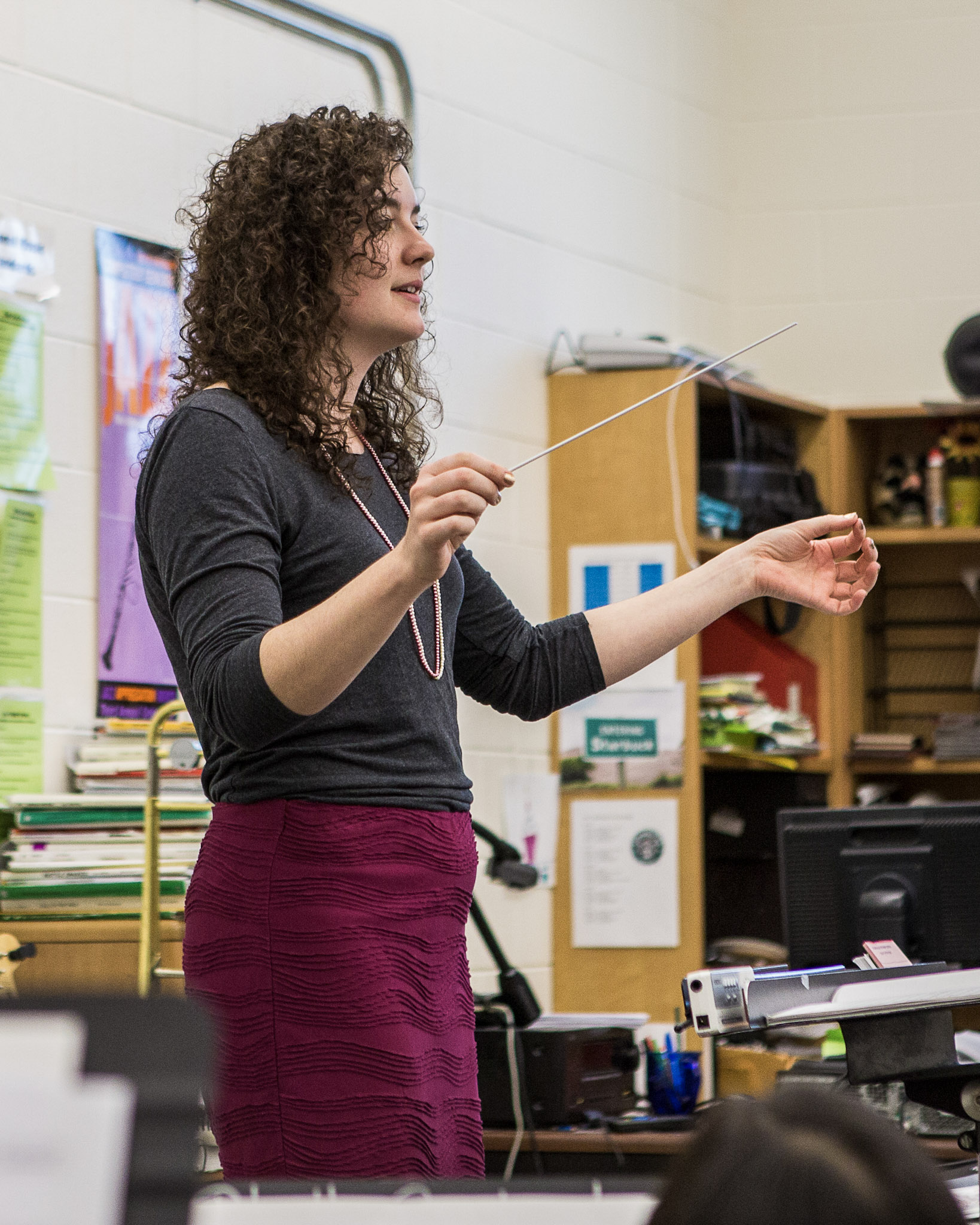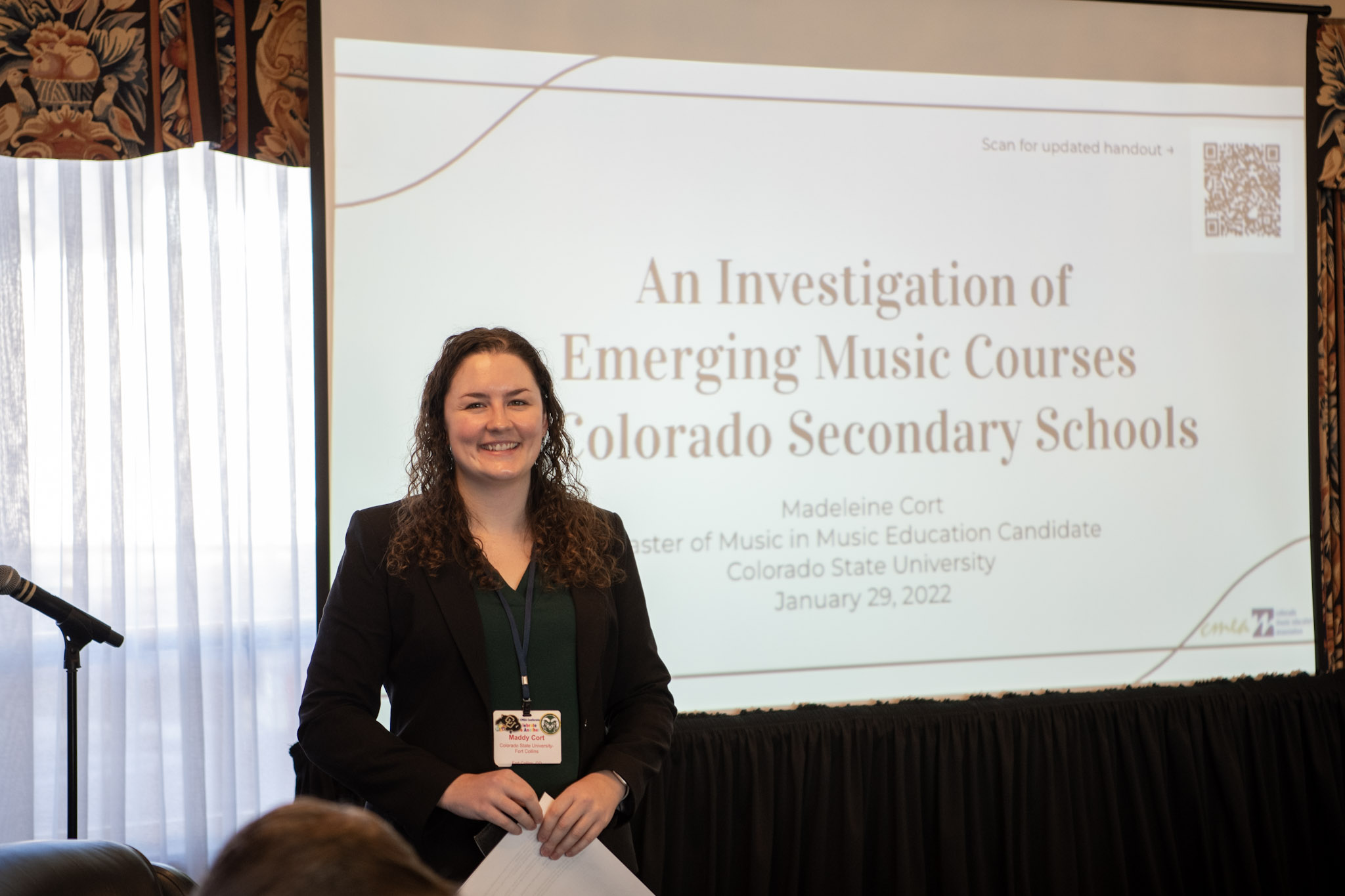
Traditional band, orchestra, and choral ensembles have existed at the core of secondary music education in America for at least a century, but in the 21st-century, music education is transforming with the addition of courses including music technology instruction, theory, composition, guitar, piano, and electronic music.
Colorado State University Music Education master’s student Maddy Cort focused her graduate research on contemporary music courses that music teachers are often requested to teach as a part of their course load in Colorado secondary schools.
Avoiding terms with negative prefixes such as ‘non-ensemble’ or ‘non-traditional,’ Cort and her CSU music professors selected a term appearing in scholarly literature to reference this segment of classes — Emerging Music Courses (EMCs).
Trending upward in popularity in Colorado high school and middle schools, EMCs allow students who do not play traditional ensemble instruments or whose musical interests lie outside of performance the benefit of music education.

National conversation about access and inclusion in music
The National Association for Music Education (NAfME), of which Colorado State University has a collegiate chapter (CNAfME), charges members to increase access and inclusion by “develop[ing] new kinds of music programs that are of interest to students…”
All students deserve access to and equity in the delivery of music education, one of the subjects deemed necessary in federal law for a well-rounded education, which is at the heart of NAfME’s stated mission: to advance music education by promoting the understanding and making of music by all.
Despite the national conversation about its importance, teacher training and administrative support for EMCs continues to vary across Colorado.
Prior to graduate work at CSU, Cort taught in the Clear Creek School District where she strived to bring large district music experiences to her small community, including exploratory courses. Cort felt alone in her efforts to teach EMCs. “They were beyond my training and outside of my comfort level as an educator and musician,” Cort explained. “It was rare for music educators to receive much training outside of the realm of ensemble music (i.e., band, choir, and orchestra) at the secondary level, but they’re still being asked to teach these courses,” Cort explained.

The research project
Cort presented “An Investigation of Emerging Music Courses in Colorado Secondary Schools” at the 2021 CSU Graduate Showcase as well as at the annual Colorado Music Educators Association conference in Jan. 2022.
Cort’s research sought to confirm what EMCs are taught in Colorado secondary schools; what learning activities are emphasized; how the pandemic impacted EMCs; and what beliefs music teachers hold about learning standards in the context of EMCs.
She surveyed 785 secondary teachers, yielding a 13.9% response rate. 61% of the respondents currently teach an EMC, including recording and songwriting, music exploration, modern band, and mariachi. The survey revealed that EMC courses uphold Colorado’s academic music standards, including expression, creation, theory, and aesthetic valuation of music. And though the pandemic forced changes to EMC objectives, many were implemented to mitigate instructional challenges. An increase in EMC enrollment was also reported.
“I think the benefit is it just reaches a kid that otherwise wouldn’t have a creative outlet at school…I think the benefit is it tends to pull those kids in and gives them an opportunity to experience music at their level in a way that they want to.” — Survey Participant
From the survey’s coded responses, Colorado EMC curriculum is being designed for outcomes similar to those nationally, and seem to mirror traditional ensemble goals:
- Instructional Objectives: performing music; music literacy; and culture, history, and popular music.
- Enduring Understandings: lifelong learning and life skills; performing music; appreciation of music.
Cort’s presentation cites participation in traditional choir, band, or orchestra at just 20% of high school students, meaning lots of students are left out of music’s valuable lessons. Participation in schools could be bolstered by EMC offerings but is juxtaposed against a lack of educator training in teaching EMC topics.
Cort confirmed the value EMCs bring to schools, and hopes her study empowers more educators to offer them. “By studying teachers’ experiences in preparing for these courses, I can promote more training for teaching these courses so educators aren’t going into them quite so empty-handed,” she said.
Teaching teachers
CSU is taking the lead in teacher preparation. Dr. Erik Johnson, associate professor of Music Education, is offering a new course — Teaching Secondary Emerging Music Courses — designed to address the growing need for professional training in exploratory courses and thus provide access for secondary level students with no prior musical experience.
The CSU music education faculty champion comprehensive teaching practices at the secondary level. “There are very few institutions nationwide that offer professional training in EMC’s, and we are hoping to change that through being on the forefront of EMC teacher training in professional music teacher licensing programs,” said Johnson.

In Dec. 2021, Maddy Cort received the CSU College of Liberal Arts Teaching Excellence Award, which recognizes outstanding teachers who positively impact students through innovative, rigorous courses and supportive practices outside of the classroom.
Cort also received a College of Liberal Arts scholarship for her Grad Showcase research presentation.
Maddy Cort’s Emerging Future
Following graduation, Cort plans to return to teaching and feels more prepared to teach instrumental ensembles and Emerging Music Courses. “In a broader sense, conducting research has taught me that if I have questions about teaching or learning, it is likely that someone else has had that question too, and I know where to look to find some answers to guide my teaching and ultimately help my students.”
Cort plans to develop a full-length session for the 2023 Colorado Music Educator Association conference. “I hope that my research furthers the discussion about these courses and perhaps inspires other researchers to look into the topic – we still have much to learn about EMCs!”
The School of Music, Theatre, and Dance offers a variety of graduate programs, including the music education master’s program that Cort is enrolled in. Learn more at the School’s website.